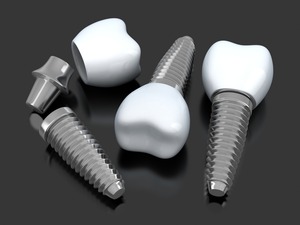Dental Implants are Made of Metal. Can They Rust?
February 8, 2024

Dental implants have been around for an incredibly long time, but it’s really only over the last few decades that they’ve found popularity among the average person. The so-called “implant revolution” hit the dental world like a storm, and since then these prosthetics have emerged as the premier method of tooth replacement.
The relative recency of dental implants’ mainstream popularity means that patients often have questions about the procedure. For example, most people know that implants are made from metal; that being the case, what are the odds of them rusting? If you’re curious, here’s what you should know in order to answer that question.
What Are Dental Implants Made From?
Dental implants come in three parts: the post that is placed surgically in the jaw, the restoration that simulates the tooth, and the abutment designed to connect the two pieces. Among these components, both the post and the abutment are made from metal.
To be more specific, the post and the abutments are typically constructed from a titanium alloy. There are many benefits to this material, with the main one being that it’s capable of actually fusing to the jawbone for enhanced stability.
Can Dental Implants Rust?
Titanium cannot corrode, and the titanium alloy used in dentistry benefits from that. This means that it’s deeply unlikely that your dental implant is going to rust.
However, it isn’t necessarily impossible. There are trace amounts of iron in the alloy that makes up a dental implant, and in some rare cases, this iron could start to corrode. For that reason, it’s a good idea to be conscientious about the state of your dental implant, talking to your dentist if you ever notice something that seems amiss.
How to Make Dental Implants Last
That said, over 95% of dental implants are successful at 20 years, and a vast majority last well over 30. So long as you’re diligent with daily hygiene—brushing twice a day, flossing daily, and seeing your dentist biannually for checkups—you should have no problem keeping your implants clean and rust-free.
About the Author
Dr. Mahima Gupta became a dentist because she loved being able to combine her immense creativity with her analytical mind. The meeting of aesthetics and science that dentistry offered was a perfect fit for her, and being able to use those skills to help others makes her work incredibly satisfying. Dr. Gupta received her dental degree from the New York University College of Dentistry. She is presently a Fellow of the International Congress of Oral Implantologists and an Affiliate Associate Fellow of the American Academy of Implant Dentistry.
If you have any questions about dental implants, she can be reached at her website or by phone at (469) 729-7707.
No Comments
No comments yet.
RSS feed for comments on this post.
Sorry, the comment form is closed at this time.



